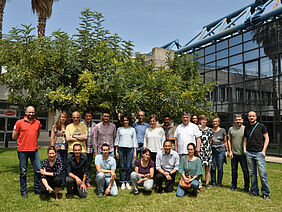Since 1 April 2018, researchers from eight European countries have been working on various research questions concerning sustainable cattle rearing. At the end of April, a first project meeting took place in Catania, Italy, where the project partners concretized the first steps of the project. Meanwhile the project website with further information is available at www.proyoungstock.net. The three-year project is part of Era-Net* CORE Organic Cofund and aims to increase knowledge about sustainable natural rearing and feeding systems for young stock in cattle and to propose new rearing methods to livestock keepers.
The early separation of cow and calf is common practice on most dairy farms, including organic farms. The consequences of this practice are highly relevant in terms of health and animal welfare. The ProYoungStock project aims to investigate the (long-term) effects of natural rearing and feeding systems on health, animal welfare and profitability in order to solve current problems and find examples of good professional practice.
Researchers want to find answers to the following questions in particular:
- Which forms of innovative rearing systems with cow-calf contact are practiced by pioneers across different European countries?
- How should these systems be assessed in terms of animal welfare and economic efficiency?
- Can the content of antibodies in milk be stimulated by cow-calf contact or feed additives?
- How does feeding increased quantities of milk to organic rearing calves affect animal welfare, behaviour and performance?
- What are the long-term effects of different environmental and feeding conditions during rearing with regard to health, longevity and fertility of dairy cows?
- How can the potential of bioactive herbal components in grassland systems be assessed to improve protein utilization efficiency, animal health (natural anthelmintics) as well as product quality?
The results of the project should contribute to reducing the use of antibiotics and antihelmintics as well as concentrate feeds while maintaining adequate performance.
Another goal of the project is the dissemination of project results, which are passed on to farmers, consultants and other interest groups through workshops, leaflets, guidelines, practice abstracts, articles, websites and scientific publications.
*The objective of the ERA-NET scheme is to step up the cooperation and coordination of research activities carried out at national or regional level.
Further information
Contact
- Anet Spengler, FiBL Switzerland
- Anna Bieber, FiBL Switzerland
Link
proyoungstock.net: Website of the ProYoungStock project
Project partners
- University of Kassel (Germany)
- Institute of Genetics and Animal Breeding of the Polish Academy of Sciences (IGHZ, Poland)
- Slovenian Holstein Association (Slovenia)
- University of Agricultural Sciences (SLU, Sweden)
- University of Natural Resources and Life Sciences Vienna (BOKU, Austria)
- Institut National de la Recherche Agronomique (INRA, France)
- University of Catania (Italy)
- Project coordinator: Research Institute of Organic Agriculture (FiBL, Switzerland)




